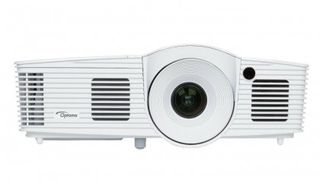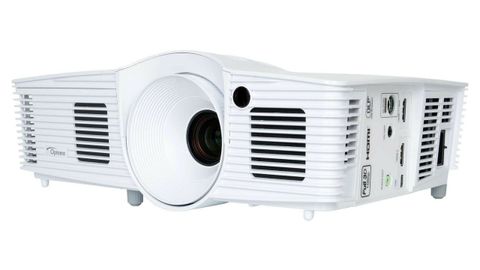Why you can trust TechRadar
It's mighty pleasing that we can be talking about a £550 projector, with a full 1080p projection, and we're not just stating that it's okay for a budget beamer. By the same token we're happy that this isn't the only option out there and there are actually other decent projectors with the same resolution that you can pick up for around the same sort of price.
And that means we don't have to just like it and lump it. The entry level Full HD projector market now has choice.

We liked
Boasting fluent images in a blackout with 'cinema' mode activated, the HD26 supplies fresh-looking, Full HD detail and strong colour and black levels. With little input lag and a bias towards bright blocks of colour, the HD26 performs well for gaming.
Game mode isn't the finest preset ever created, but it ceases all processing (with Brilliant Color being the main culprit). Meanwhile, the remote control is backlit – a huge clue that this was designed especially for home cinema use – and the inclusion of a 12V trigger is also a nice bonus (though I suspect that anyone wanting to integrate the HD26 into a whole-room control system will probably spend a little more on the centrepiece).
The HD26 proved relatively quiet when measured for audible noise, the HD26 hit 59 decibels', which was far from distracting. The provision of a side-panel of inputs was also welcome; who wants to pull-out the entire projector from an AV rack just swap over a HDMI?
We disliked
Aside from so-so images, especially in bright conditions, the HD26's set-up flexibility is limited. Its 1.1x zoom and the do-we-have-to keystone correction is all there is; placement is thus everything, which means your home ents set-up needs to be structured around the HD26. If only there were vertical and horizontal lens shift levers; both should be law on all projectors.
The HD26 has limited connectivity, too, with the second HDMI inputs ostensibly replacing a VGA or DVI, component video and composite video inputs. Is that too restrictive? If you do want to use it for work or with legacy equipment, absolutely (though since many laptops output via HDMI, having a fat choice of ins and outs is fast becoming a non-issue).
Although it won't effect (or bother) everyone, I also noticed some rainbow effect from the single-chip HD26, especially during black and white footage. The cure? Go for a pricier three-chip DLP projector, or LED.
Verdict
It says something about the advancements in home cinema projectors in the last year or so that this great value HD isn't our favourite entry-level projector around.
Odd, because it's got everything going for it; excellent images, a compact size, quiet operation, and a superbly low price. It's great for gaming, and at its best – for black levels and colour – when watched in dimly-lit, traditional home cinema conditions (and it even has a backlit remote control).
However, with brighter projectors around that can offer all of this and more detail during the day as well as in a blackout, and with both a bigger choice of ins and outs and optical image shift options for maximum versatility, the HD26 struggles to hold up against the competition.
Jamie is a freelance tech, travel and space journalist based in the UK. He’s been writing regularly for Techradar since it was launched in 2008 and also writes regularly for Forbes, The Telegraph, the South China Morning Post, Sky & Telescope and the Sky At Night magazine as well as other Future titles T3, Digital Camera World, All About Space and Space.com. He also edits two of his own websites, TravGear.com and WhenIsTheNextEclipse.com that reflect his obsession with travel gear and solar eclipse travel. He is the author of A Stargazing Program For Beginners (Springer, 2015),


